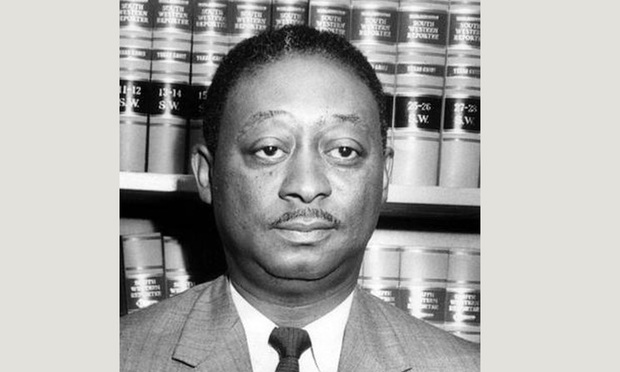Death Penalty Rejected Again for Killer of Pioneering Dallas Civil Rights Attorney
For the second time in eight years, Texas' Court of Criminal Appeals has reversed the death sentence of a man who was convicted for the brutal killing of pioneering Dallas civil rights attorney Fred Finch, one of the first African-American graduates of Harvard Law School, because a jury was not properly instructed about the defendant's intellectual disability.
December 07, 2018 at 03:31 PM
4 minute read
 Fred Finch (Courtesy photo)
Fred Finch (Courtesy photo)
For the second time in eight years, Texas' Court of Criminal Appeals has reversed the death sentence of a man who was convicted for the brutal killing of pioneering Dallas civil rights attorney Fred Finch, because a jury was not properly instructed about the defendant's intellectual disability.
Kenneth Wayne Thomas was convicted of capital murder and sentenced to death in 1987 for the slayings of both Fred Finch, one of the first African-American graduates of Harvard Law School, and his wife, Mildred Finch, a college math instructor, in their modest home in South Dallas.
Fred was a World War II veteran who served as a Tuskegee Airman before graduating from Harvard Law in 1954. He later returned home to Dallas, where he became a civil rights attorney who helped desegregate the University of Texas at Arlington and Texas Woman's University. His wife was a beloved professor at Dallas' El Centro College.
According to the decision, Thomas stabbed 64-year-old Mildred more than 80 times and 66-year-old Fred more than 20 times. Thomas, known on the street by the name “Clean” for his well-dressed appearance, stole Fred's clothes and watch and later told family members that he had “killed them folks on TV,” referring to news reports about the murders, adding “dead folks can't talk,” according to the decision.
Thomas was later charged with and convicted in 1987 of the murders. In 2010, the CCA affirmed the convictions but voided Thomas' death sentence because the 1987 jury was not allowed to consider whether Thomas' low intelligence, brain damage and mental illness warranted the imposition of a life sentence rather than a death sentence.
In 2014, a trial court held a second punishment hearing for Thomas and again sentenced him to death.
Thomas again appealed his death sentence to the CCA, arguing that the evidence standards used during his 2014 trial for deciding whether a person has an intellectual disability had since been rejected by the U.S. Supreme Court.
And in a 5-4 decision released this week, the CCA agreed with Thomas' argument and granted him a third punishment hearing that could decide whether he receives a life sentence or a third death sentence.
“Based upon our review of the record, we hold that, because the jury was not presented with the proper diagnostic framework regarding Thomas's claim of intellectual disability, then as a matter of due process, Thomas is entitled to a new punishment hearing,” wrote Judge Bert Richardson in the majority decision. “We vacate Thomas's death sentence, and remand this cause for a new punishment proceeding.”
CCA Presiding Judge Sharon Keller dissented to the majority decision, noting that Thomas' claim of intellectual disability was not preserved for appeal and because the majority did not conduct a harm analysis.
“The court should either have conducted a harm analysis or explained how this particular claim was immune from a harm analysis,” Keller wrote in her dissent. “Because the court has done neither of these things, even if I believed that Appellant's claim was preserved, I would not be able to join the Court's opinion.”
Kimberlee Leach, a spokeswoman for the Dallas County District Attorney's Office, said the decision on whether to seek a third death penalty punishment hearing for Thomas will be left up to incoming DA John Creuzot. Creuzot, a Democrat, defeated Republican Dallas DA Faith Johnson in the November 2018 general election and will take office in January.
John Tatum, a Richardson attorney who represents Thomas, did not return a call for comment.
This content has been archived. It is available through our partners, LexisNexis® and Bloomberg Law.
To view this content, please continue to their sites.
Not a Lexis Subscriber?
Subscribe Now
Not a Bloomberg Law Subscriber?
Subscribe Now
NOT FOR REPRINT
© 2025 ALM Global, LLC, All Rights Reserved. Request academic re-use from www.copyright.com. All other uses, submit a request to [email protected]. For more information visit Asset & Logo Licensing.
You Might Like
View All

Sheppard Mullin Expands in Dallas With 6-Lawyer White Collar Team From Bradley
3 minute read
Once the LA Fires Are Extinguished, Expect the Litigation to Unfold for Years
5 minute read
Trending Stories
- 1CFPB Proposes Rule to Regulate Data Brokers Selling Sensitive Information
- 2Arizona Board Gives Thumbs Up to KPMG's Bid To Deliver Legal Services
- 3Matt's Corner: Legal Malpractice as It Relates to Ethical Violations
- 4Statute of Limitations Shrivels $5M Jury Award to Less than $1M, 8th Circuit Rules
- 5Navigating the Business Immigration in a Second Trump Administration
Featured Firms
Law Offices of Gary Martin Hays & Associates, P.C.
(470) 294-1674
Law Offices of Mark E. Salomone
(857) 444-6468
Smith & Hassler
(713) 739-1250






